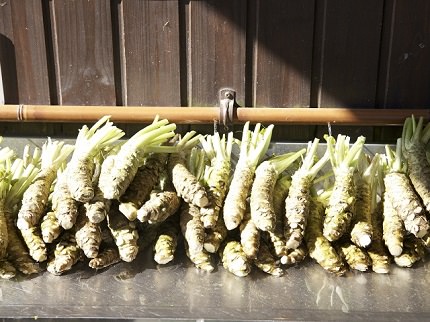-
- USA/Canada 1-800-285-2726
- Australia (02) 8006 4411

Wasabi is Japanese horseradish, most common in its paste form, most commonly served with sushi. Wasabi itself is a root vegetable, but not easily found in areas outside of Japan. Due to its cost and unavailability, much of the wasabi one has consumed might not have been grated from the actual plant. Instead, the wasabi might have just been a mixture of horseradish, mustard, starch, and green food coloring to depict the wasabi paste look.
Although the use of wasabi outside of Japan has not spread much besides accompanying sushi and sashimi, wasabi is commonly used in Japanese dishes everyday. Wasabi is often put into the dipping sauce when enjoying cold noodles (soba) and some people dip cooked meat into a wasabi soy sauce dipping sauce. The tingle to the nose that wasabi gives when consumed vanishes right away, leaving no bitter aftertaste.
When eating sushi or sashimi, wasabi is often served with picked ginger tsukemono, or Gari, to act as a palate cleanser between dishes. While there are other tsukemono options, wasabi & gari tend to go hand in hand. You'll have a chance to learn more about this famous sushi garnish during our Wasabi Farm visit on the way to Takayama on our fully-guided Takayama Festival Japan Tours in Spring & Autumn!
Ice-Cream made with the popular sushi garnish at the Wasabi Farm
Famous for its Japanese horseradish, wasabi
Most known for its green tea production
Traditionally consists of seafood placed on top of a chunk of vinegared rice
Tsukemono means pickled vegetables in Japanese. Surrounded by ocean, Japan developed its tsukemono culture in a unique way.
Umeboshi is a typically traditional pickled Japanese plum. It's necessary food to Japan's dining.
Sashimi is sliced raw fish dipped in soy sauce with a bit of wasabi
Fugu, Japanese pufferfish, is a common delicacy in Japan